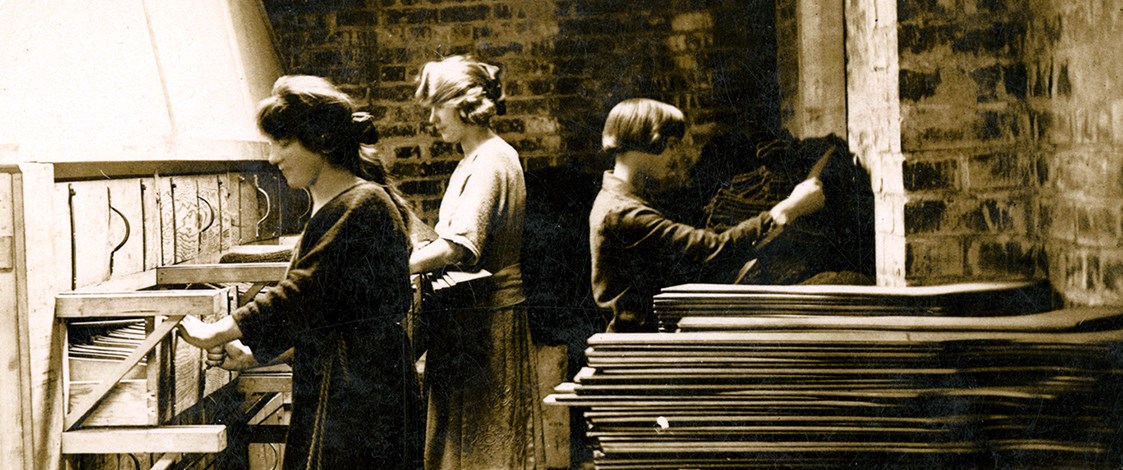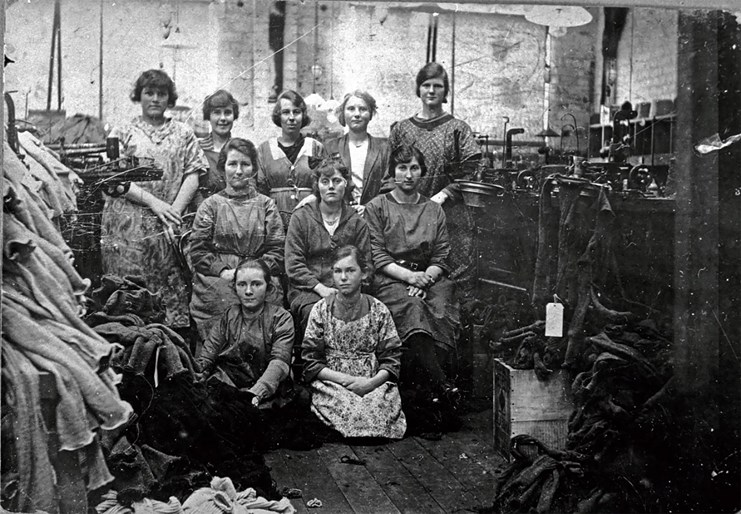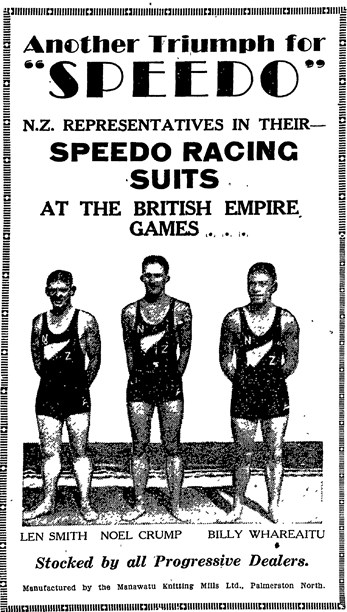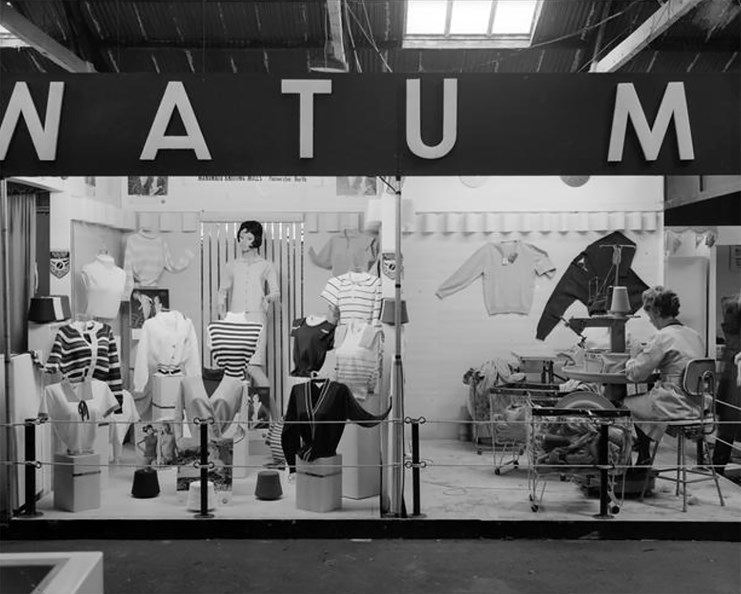Stories
Manawatu Knitting Mills
1889-

Manawatu Knitting Mills is one of the New Zealand garment industry’s venerable institutions and can rightly claim the title of our oldest knitwear manufacturer. Its history has not been an easy one, but it is one that has been deeply connected with its community for more than 130 years.
Settlers to New Zealand in the mid and late 1800s were an industrious lot and included the pioneer heroes behind entrepreneurial knitwear manufacturers such as Roslyn, Canterbury and the Manawatu Knitting Mill (MKM). Mary Alice Stubbs had emigrated from England in 1880 with her husband John, their three children and John’s parents. While the men worked on the land to try to establish themselves in this new land, Mary Alice imported a Griswold hand-operated circular sock knitting machine in order to produce socks for their own needs but also as a cottage enterprise aimed at supplementing the family income. The success of her endeavours led to the importation of a second machine that could knit flat lengths of material enabling her to make other essential woollen garments. By 1884 the knitting business was booming and her husband, who had been a draper in England, joined her. In 1889 they moved their house, children and cottage industry off the farm and onto Main Street in Palmerston North where the business was given John's name and became J Stubbs, Hosiery Manufacturer.
As the business grew they began employing staff, expanding the family home to accommodate them and also additional new machinery. They not only made hosiery but also woollen under and outerwear including workmen’s singlets and significantly, the rugby shirts worn by the Originals, the first All Blacks, for their 1905 tour of England and Australia. When John died suddenly in 1912 their son Piercy, who was already working in the factory, joined his mother in running the business. The company prided itself on their technical innovation and responsiveness to changing trends and in 1918 they imported New Zealand’s first Cotton Patent Frame Machine in order to produce fully fashioned cotton outer garments and underwear. Ivy Stubbs, Piercy’s wife, was also an innovative thinker and designed a V-neck pyjama so that there was no need for buttons, a design which the company patented.
This strength in technology and design was not matched by business savvy and over the years a few poor decisions had cost them dearly. Coupled with this the demands of constant growth and development of the business required deep pockets, something they had been unable to achieve and in 1919 J Stubbs, Hosiery Manufacturer was sold. The Stubbs family did however maintain shares in the company, now called the Manawatu Hosiery Factory and Piercy continued to work there on the technical side of the business with William E Winks coming on board as the financial manager.

Workers at the Manawatu Hosiery Factory, which later became the Manawatu Knitting Mills, early 1920s.
The New Zealand economy was caught up in the Great Depression of 1930 and at the mill the employees were offered the choice between a reduction in workforce numbers or a reduction in hours. They opted to share the work and no one was laid off at the Manawatu Hosiery Factory. When the parent company failed in 1932 with the threat of closure, William E Winks went to the community for support. He found 72 local investors, a third of them women, to put up enough money to keep going. Renamed Manawatu Knitting Mills, the business survived and flourished. In 1934 a photograph of the staff shows 83 staff members; 67 women and 16 men, outside the brick building on Main Street.

Manawatu Knitting Mills manufactured Speedo swimsuits worn by competitors at the British Empire Games. Advertisement from the Auckland Star, 13 December 1934.
The war years were a boom time for MKM who were designated an "essential industry". Big production runs of khaki jerseys, puttees and socks meant long days in the factory. They also made underwear for the military with at one stage a record ninety dozen singlets being produced in a single day. In the post war years the company continued to be an important contributor to the local economy providing work in all aspects of the production of knitted garments from winding the yarn, maintaining and operating the knitting machines, cutting, linking, sewing and steaming the garments. MKM was producing shearer’s singlets, work jerseys, swimsuits, socks and underwear for the whole family, and some fashion wear.

Manawatu Knitting Mills trade stall, 1966. Photo courtesy of Palmerston North Libraries and Community Services. Image © Attribution 4.0 International (CC BY 4.0).
In the last three decades, the New Zealand textile, clothing and footwear industry has downsized by some 90 percent. The radical economic reforms of the 1980s which removed tariffs and import restrictions plus the fallout from the 1987 stock market crash which saw the fall of the Corporations which had bought out our most successful companies, led to the devastation of local production. MKM is one of the few survivors making it the oldest knitting company in New Zealand. As the General Manager since 1985, John Hughes, has successfully taken the business through these challenges and embraces the company’s heritage.
Still based in Palmerston North and providing work for over 50 employees from the local community, MKM produces an 'Originals' line that includes the iconic black shearer’s singlet in coarse and fine wool as well as rugged outdoor jerseys. In 2011 when the Rugby World Cup was hosted in New Zealand, a replica of a 1905 Originals All Black jersey was knitted at the mill for exhibition. In 2014 MKM reproduced a women’s woollen swimsuit from a 1934 photograph for a fund-raising event for the hospice in Palmerston North.
The business continues to be innovative developing technology to work with an extended range of natural fibres including possum, camel, alpaca, cashmere and angora which it combines with the original material, wool, including merino. It is supplying premium knitted products to the tourist market and to the sports market. In 2007, when fellow Manawatu region woollen goods producer Norsewear was sold and its production was taken off shore to China, a consortium including MKM bought the sock knitting plant in Norsewood. Providing work for 10 employees and producing New Zealand-made socks as the Kiwi Sock Company Ltd, it might seem that MKM had come full circle.
Text by Doris de Pont with thanks to Jill White’s Women at work in the Manawatu Knitting Mills. Banner image of women working at MKM in 1925, courtesy of Ian Matheson City Archives.
Last published January 2018.